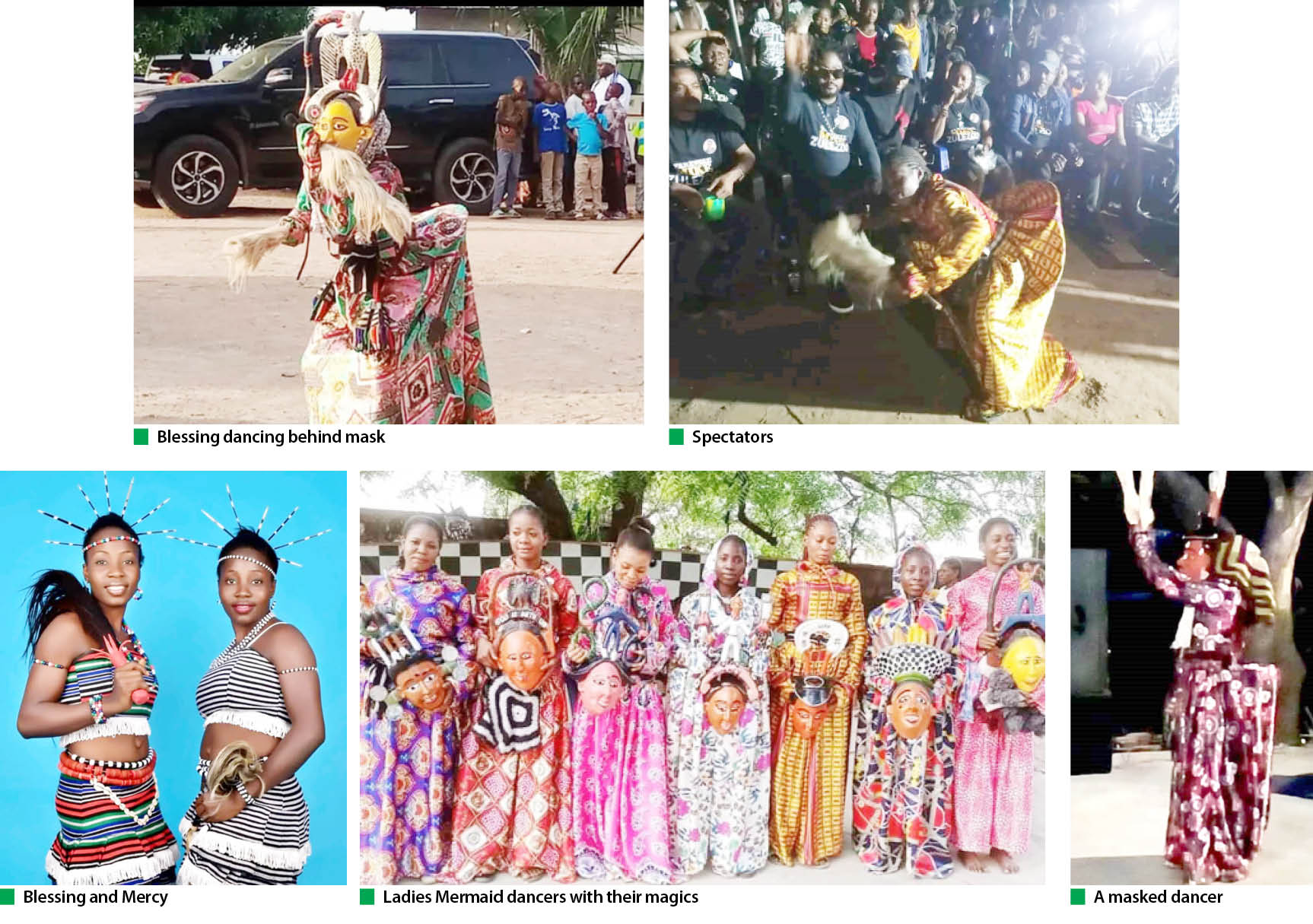The Tiv people of Benue State are known for their various cultural displays, especially mammy wata (mermaid) dance often displayed at occasions.
Fun lovers in local parlance also refer to the fascinating theatrical art as ajigber or jôv mbakuv.
The dance has over the years become a delight for spectators, especially at performances to mark the end of the year.
The dancers are masked in “mermaid” costumes and make intricate movements accompanying the beat of drums to suggest that they are mermaids.
- Brace up for recovery, reps’ minority caucus urges Nigerians
- North East: In seeking for President Buhari’s intervention
Blessing Nev, a top performer of the mammy wata dance, said, “The mammy wata has been a dance for the male folk for years, but we (female) only wanted to give it a try and it came out perfect. So, ever since we have continued to perform the dance. In fact, I performed it in a competition and came second.”
Nev dispelled the belief by lots of people that there is the involvement of mysticism in the art occasioned by body movements in which performers twist themselves.
She said, “There’s no magic about this dance. The magic there is the body movement, costume and tactics.
“Also, there’s nothing occultic about the dance; the only difference about this dance is the costume, the mask and energy.”
She further explained that the mammy wata was mostly performed during Christmas and New Year celebrations, but that she could do the dance anytime to the delight of her admirers.
She added that, “We have been doing well though it has not been easy. God has always helped us to get on. In the future, however, I hope to start a troupe of my own with the support of many people.”
Nev’s twin sister and mammy wata dancer, Mercy, expressed optimism that the dance would continue to enable her to promote her culture.
She said, “Someone encouraged me to do the dance. I tried it and fell in love with my performance. It gives me joy. Before now, I did other different kinds of Tiv dances, but I ventured into the mammy wata two years ago.
“The challenge about the dance for me was when I started it wasn’t easy, especially in wearing the mask. But I endured it. For instance, the first day that I wore the mask to perform, I was suffocating and it felt like I was going to die. However, I endured it to the end of the performance on stage.”
She further said, “There is nothing occultic about the mammy wata dance now, but our fathers were involved in it in their days. What we do now is to improve on the culture and nothing more. I used to work for Takuruku Entertainment, but right now I do other things on the sidelines while awaiting the process to get into a higher institution.”
For Abigail Ahula, another female dancer, her debut into the mermaid dance was simply to prove to the male counterparts that the dance after all was not their exclusive right.
She said, “Truly, the dance used to be exclusive for the menfolk, but I want to prove that women can even do better. I have been into mammy wata dance for at least two years now, but the major challenge I faced was at the initial stage. I had a lot of body pain, and of course I found it difficult to use the mask, but now I have perfected the art to keep my breathing steady when masked.
“We normally have our peak performances at Christmas, though we still do it anytime we are called upon. We do it on request any other time of the year. I have benefited a job through this dance. It was during one of our performances that the president general of Mdzough U Tiv noticed me on stage and assisted me to get employment as a teacher where I work presently.
“But I still perform, the teaching job hasn’t hindered me in any way. I would like to say that there is nothing magical about the dance but people can be suspecting something fishy because of the mask we wear.”
A cultural enthusiast, Tahav Agerzua, who recently announced a live show involving the twin dancers at Kenville Park in High Level, Makurdi, disclosed that the two stars of Takuruku Performing Troupe were to perform to entertain neighbours on their birth anniversary.
Agerzua, who is the immediate past Principal Special Assistant (PSA) to Governor Samuel Ortom, noted that, “The great dancers, Mercy and Blessing Nev, picked up their dancing skills at High Level, Makurdi, where they were born and bred where their mother owned a restaurant close to Ebony Theatre – the first modern private cultural troupe in the state.
He said, “The place where they will perform (during the birthday) is within sight of where their family lived at the time of their birth about two decades ago. Ade, their mother, recalls that right from their days as toddlers the artistes from Ebony Theatre captivated the girls.”
He further said that their mother, Mrs Nev, recalled that, “Whenever they were rehearsing the two would climb the short fence that separated our house and the troupe’s premises to watch. They would be engrossed and would do nothing else but watch.”
He added that the twins who hailed from Abeda Mbadyul in Logo LGA affirmed that Ebony Theatre introduced them into the entertainment world when they assigned the role of children to them in a drama when they were five years old.
Agerzua also noted that at the age of seven, Eugeneous the Great made the twins act in a film.
He said, “Now in their 20s, both of them performed with several troupes before they jointly featured in the Swange Music and Dance Festival 2019 as members of Takuruku Entertainment Troupe that emerged overall best.
“Besides their spectacular performances in cultural and modern dances, their outstanding creativity and talent have manifested in their invasion of the male-dominated mammy wata dance.”
In a similar development, Dr Charles Iornumbe, a mammy water (ajigber) dancer in his younger days, said, “Those moments remain memorable for me. I didn’t just only feel fulfilled but elated that I made my family proud. I loved to interpret my role to the admiration of my audience, especially when my clothes were properly sown to fit my size. I’d wriggled my waist and dance with passion.”
Iornumbe, who is the Director General (DG) of Radio Benue, carried out his doctoral research on traditional heritage such as Tiv customology, having being propelled by the indigenous dances of the people and because he had earned a living and paid his way through school from the gains of the theatrical dances, including kwagh hir, even as he noted that there were no magical strings to the dance.
He posited that, “Except that we cannot rule out the fact that some people go as far as acquiring charms so that they could undo other troupes during competitions.”
President General of Mdzough U Tiv (MUT, Tiv’s highest socio-cultural body, CP Iorbee Ihagh (Rtd), while commenting on the advancement of the dance, assured that his leadership would thrive to uphold the custom, culture and tradition of the people.
Ihagh said, “”Females are delving into the dance. We will promote and preserve the culture. Culture is dynamic and you don’t need to throw it away; even if you go to Israel where Jesus was born, they have kept their culture. So, culture is not something to play with. You can try to improve on it so that you can preserve it for unborn kids to come and know that this was the culture of their forebears.”

 Join Daily Trust WhatsApp Community For Quick Access To News and Happenings Around You.
Join Daily Trust WhatsApp Community For Quick Access To News and Happenings Around You.


